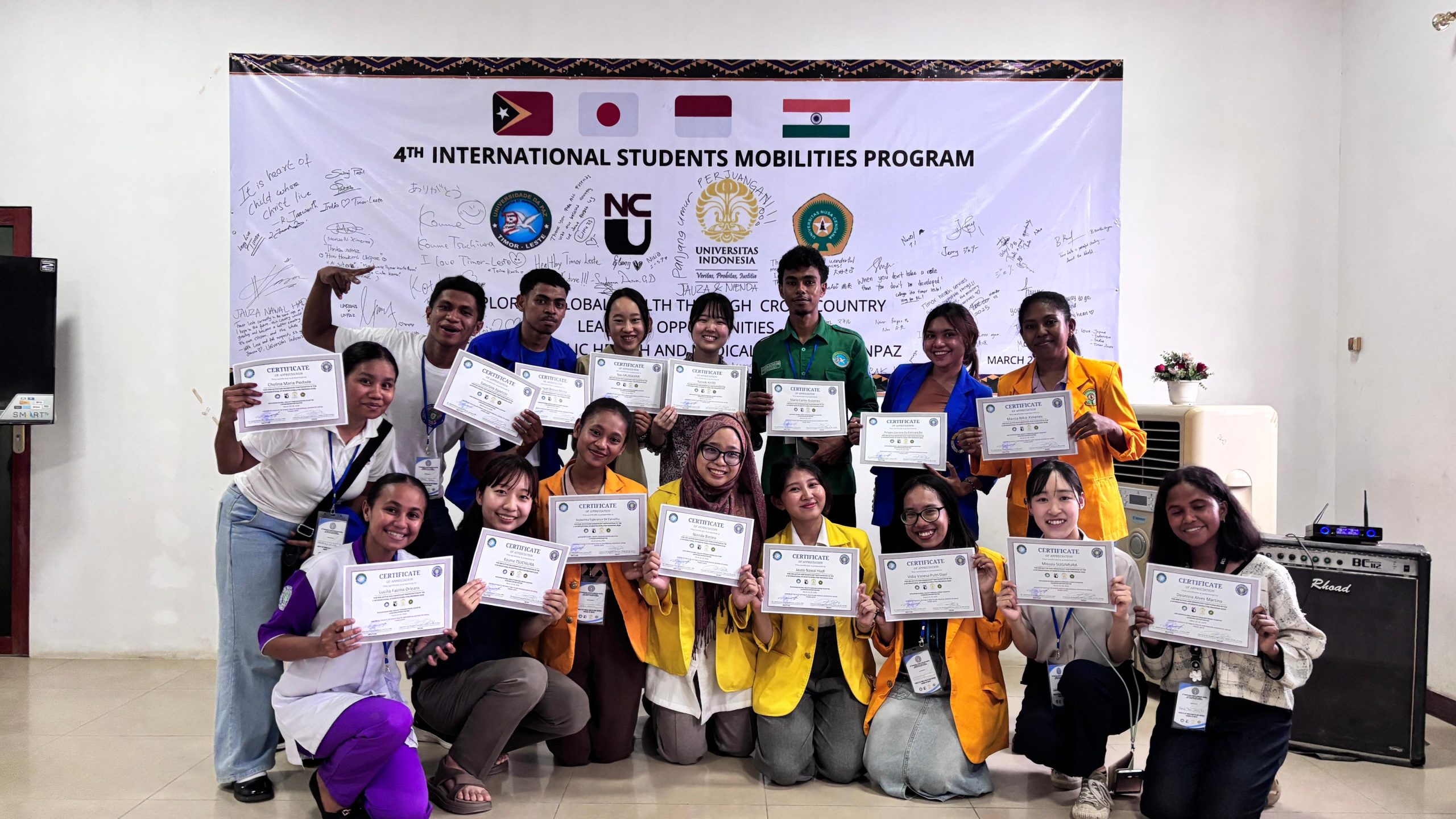International experience is a crucial way to broaden one’s horizons and enrich cross-cultural perspectives, especially in public health. This drove Jauza Nawal Hadi and Nienda Biellani, students of the Bachelor of Nutrition program at the Faculty of Public Health (FPH), Universitas Indonesia (UI), to participate in the International Student Mobility Program organized by Universidade da Paz (UNPAZ), Timor-Leste, from March 20–27, 2025.
This program is part of UNPAZ’s initiative to build international networks and bring together students from various countries to learn about public health dynamics in developing nations. This year marked the first time Indonesian students, including those from UI, took part. In addition to UI, participants came from Nagoya City University (Japan), the MSBB Program (India), FPH Universitas Nusa Cendana (UNDANA), and host students from UNPAZ.
For Jauza, one of FPH UI’s participants, this was not her first exchange experience. She previously joined a similar program in the United States. However, her interest in global health issues and the diverse challenges faced by different countries motivated her to expand her experience further. Timor-Leste was chosen because it is a relatively young nation striving to build an inclusive health system, especially in rural areas. Jauza also sought to gain new insights from a neighboring country that often receives less international attention. “After participating in the program in the U.S., I wanted to complement my understanding of public health by seeing realities in a developing country geographically and culturally closer to Indonesia. I believe Timor-Leste offers a unique perspective that is equally compelling,” said Jauza.
On the first day, participants attended an opening session and seminar led by UNPAZ’s Dean and representatives of partner universities. They received an overview of Timor-Leste’s national health system, nutritional challenges, and the role of higher education in supporting public health development. Days two through four featured field activities and direct observations at health facilities and community villages.
One of the most memorable visits was to Mota Ulun Village in Liquica, a mountain village that serves as a pilot site for sanitation development and local food empowerment. There, participants observed the construction of public bathrooms, watched community activities where local mothers used native ingredients to combat stunting, and saw efforts to improve child nutrition. “We were warmly welcomed by the community. They enthusiastically shared the changes they’ve experienced since the empowerment program began. Although access to the village was challenging, this experience opened my eyes to the importance of community-based interventions,” Nienda recalled.
Participants also visited health facilities such as Manatuto Health Service and Becora Community Health Center. At these sites, they learned how Timor-Leste distributes therapeutic foods, such as Ready-to-Use Therapeutic Food (RUTF), to vulnerable groups, including pregnant women and young children. They also observed basic health services and patient referral mechanisms. Although the program was brief, the intensive learning and discussions made it highly meaningful. For Jauza and Nienda, the main challenges were not academic but rather linguistic and geographic. Tetum and Portuguese, the official languages of Timor-Leste, made initial interactions limited. However, local students fluent in English and Indonesian helped overcome this barrier.
Support from FPH UI was also invaluable. Jauza and Nienda expressed gratitude to their academic advisor, dr. Fathimah Sulistyowati Sigit, M.Res., Ph.D., who provided full guidance from the selection process through departure. They were also grateful for the financial assistance from the faculty, which allowed them to participate more freely.
It is hoped that more students will be interested in similar exchange programs, not only to developed countries but also to developing nations that offer valuable lessons about real-world health development. “Many people think studying abroad means going to highly advanced places. But for me, learning from the limitations and spirit of communities in developing countries is even more inspiring. We become more aware that progress is not just about technology but also about empowering people,” Jauza concluded.
Through this program, Jauza and Nienda not only returned with new knowledge of their neighboring country’s health system but also strengthened their empathy, collaborative spirit, and cross-cultural adaptability. These are invaluable assets for their development as future nutrition experts and public health professionals ready to meet global challenges.

